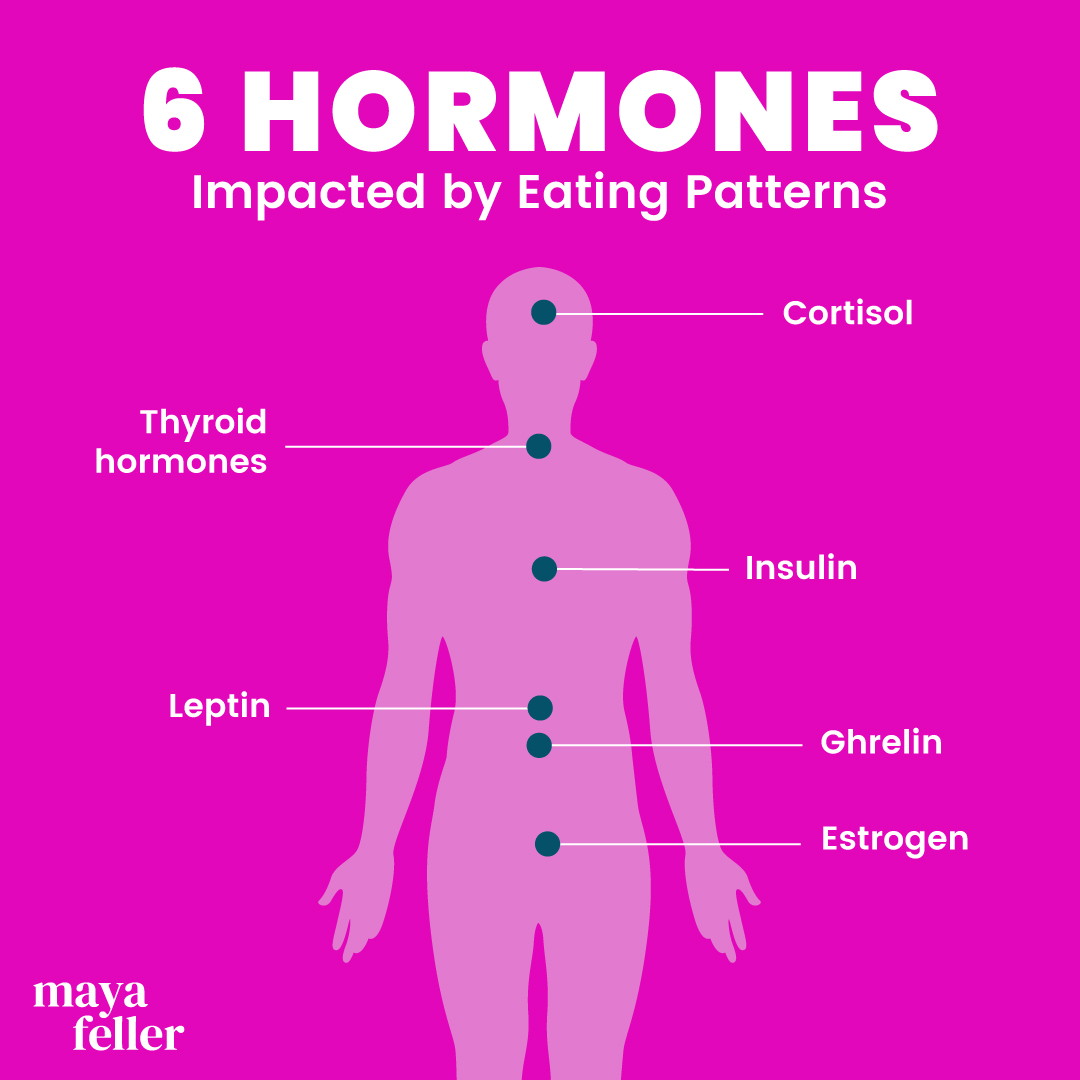What You Need to Know About Your Eating Patterns and Hormones
Have you ever considered that there may be a link between your eating patterns and hormones?
Many of us are living with and managing hormonal imbalances, which can stem from a variety of causes and can result in diabetes, insulin resistance, thyroid dysfunction, and more.
But there is a link between your eating patterns and hormones, meaning that both what you eat and how you eat can impact your hormones in a major way.
Let’s review the relationship between eating patterns and hormones and then take a look at six of the major hormones impacted by eating patterns.
Eating Patterns and Hormones: What the Research Says
Your eating patterns and hormones are connected in a variety of ways. Here are a couple of the most frequent hormone disruptors.
1. Specific foods
Before we jump into this topic, I want to preface it by saying that each of us has unique nutrition needs, and we should eat foods that are representative of the diverse backgrounds from which we come. Demonizing foods is never productive.
That said, when it comes to eating patterns and hormones, if you experience a reaction to a certain food or foods, it could disrupt your hormones. If this occurs, reach out to a dietitian or qualified healthcare provider to help you identify the root cause of this imbalance while working to find a solution.
So, what kind of reactions can impact your hormones? Some of the most frequent are food sensitivities, food intolerances, and food allergies.
While allergies (an immune reaction) usually occur in eight or nine specific foods, research has shown that intolerances and sensitivities are more likely to occur with lactose (a sugar found in milk-based foods and food products) and gluten (a protein found in many wheat-based foods and food products), as seen in non-celiac gluten sensitivity. [1, 2]
For example, did you know that several studies show a strong link between both gluten intolerance and both Hashimoto’s thyroiditis and type 1 diabetes.
In fact, celiac disease was three times higher for people with type 1 diabetes than for those without diabetes. And it’s commonly believed that gluten sensitivity may cause a thyroid flare (hypothyroidism) because gluten has a similar molecular structure to thyroid tissue. [3, 4]
2. Over-production of gastrin
Another way your eating patterns and hormones are linked is in the amount of gastrin that is produced by your stomach. When we eat, signals are sent to the stomach and gastrin is secreted to help break down your food.
Once gastrin is secreted, signals are sent to release stomach acid to help digest your food. [5]
Gastrin is secreted in relation to the quantity of food consumed. So, when excess amounts of gastrin are secreted, you could have an excess of stomach acid, resulting in everything from reflux to diarrhea. [6]
3. Underconsumption of food/fasting
Finally, consistent underconsumption, or fasting, is another way your eating patterns and hormones are linked. To be clear, there are instances when fasting may be indicated. (This is not recommended for people who have either an active or a history of eating disorders).
According to a 2016 meta-analysis of 13 studies with 357 participants, in comparison to consuming low calorie diets, fasting for an extended period of time had a very strong effect in increasing cortisol levels. [7] (Cortisol is the hormone your body secrets in response to experiencing stress.)
Meanwhile, other studies have shown that fasting can help improve blood sugar and insulin levels. [8]
6 Hormones Impacted by Eating Patterns
Now that you have an idea of how your eating patterns and hormones are connected, here are some of the major hormones that are impacted by your eating patterns.
- Cortisol—the hormone your body releases to help adapt to stress, both emotional and physical.
- Estrogen—the reproductive sex hormone.
- Grehlin—the hormone that stimulates hunger.
- Insulin—the hormone that controls the amount of glucose in your blood.
- Leptin—the hormone that subdues hunger.
- Thyroid hormones—the hormones produced by your thyroid gland and impact almost every area of your body, from your metabolic rate to body temperature to bone health and more!
Implementing Healthy Hormone Habits
While it’s important to establish healthy eating patterns that feature whole, nutrient-rich foods, there are also other ways you can help balance your hormones. Here are a few tips to help maintain hormonal health:
- Prioritize your sleep quality. Try to get anywhere from seven to nine hours of sleep each night.
- Reduce your stress. Whether you enjoy going for a walk, meditating, or even shopping or watching a funny movie, engage in an activity that will help you to de-stress.
- Spend time in nature. Finally, make sure to enjoy time outdoors. Studies have shown that spending time outside lowers frustration and even decreases cortisol levels. [9, 10]
- Focus on maintaining healthy relationships. Research has shown that our support system is key for longevity, proving that your lifestyle and with whom you surround yourself is just as important as nutrition and exercise. [11] Don’t forget to make time for those you love and who make you feel loved in return.



Leave a Reply